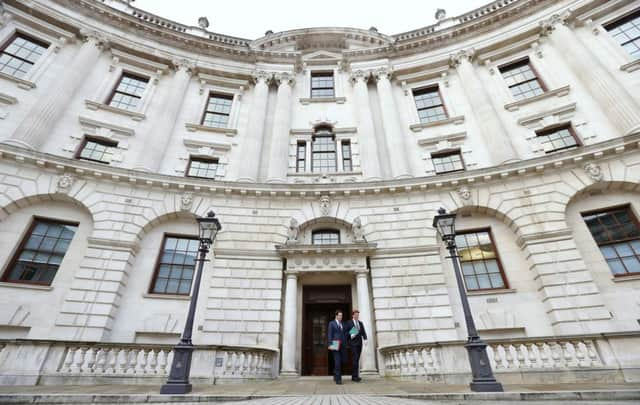Andrew Wilson: The secret’s out on UK shared debt


For the innocent voter, seeing through the fog and noise of remarkably intemperate shouting from lots of senior figures who should know better is not often simple. The topics can be complex and arcane, but they matter, very much, for how we live our lives.
The UK national debt is very large and probably topped £1.2 trillion last year. The cost of paying the interest on it annually will approach £50 billion. This is a lot of money. The UK pays more for its debt than many smaller European countries with better credit records.
Advertisement
Hide AdAdvertisement
Hide AdLast week, the Treasury issued inevitable guidance to the markets to the effect that the UK would stand behind this debt in the event of Scotland becoming independent. Debt providers, including the Bank of England, which owns about one-third, have a legal contract with the UK government.
The UK government position is that Scotland would be a new state, hence the need to reapply to the EU, for instance, rather than a more co-operative outcome being one of two successor states inheriting rights and obligations. This is one of the many negative consequences, for themselves, of their own position.
Their general political position is that everything will go wrong for Scotland and the rest of the UK will deploy policies to the detriment of Scotland in a “beggar thy neighbour” stance.
This is neither truthful nor likely nor a reflection of any equivalent situation in history. But the stance they have taken in fighting this fight is to be infantile and puerile. And on the national debt question it just got exposed for what it is.
However, let us be bigger people than that. It is required of us as progressives. Let us concur that while Scotland now has literally zero legal obligation to accept any UK debt share, we do have a moral one and likely a political one when agreement discussions commence. Keep in mind the legal and political distinction as time goes on. Just as there will be costs to be divided and debts to be divided, so to there will be income and assets. Such as the assets of the Bank of England, for example, unless of course we remain in sterling, as everyone will be incentivised to ensure. You wouldn’t think that to listen to our London government of course.
So here for reasonable people everywhere is the obvious adult route through.
If Scotland becomes independent and doesn’t take a share of the debt, the cost of servicing that debt will rise for the rest of the UK, as they will have a smaller economy servicing the same debt, so the risk will rise along with the costs. So the incentive is for the Treasury to become adult again the minute we vote Yes on this as in other issues.
The problem for Scotland is that we have no credit rating. Not our fault – it’s just we currently have no power to borrow. Cambridge University has the power and a better credit rating than the UK. We need to establish a record of being good borrowers so the markets will lend to us at good rates. If we take on, say, £102bn inherited UK debt at current servicing costs of more than £4 billion per year, it is likely the cost of servicing it will go up as the markets watch for our credibility. The cost for the rest of the UK could rise also, especially if markets felt they were following through on their rhetoric on beggaring both neighbour and self.
Advertisement
Hide AdAdvertisement
Hide AdWe can publish fiscal rules and guidance, of course, but the markets learned from UK failures not always to believe them. They will judge us by what we do.
So it would be in everyone’s interest for the debt to remain with the UK Debt Management Office (DMO) and for Scotland to pay the cost of servicing it. The Scottish DMO would then only be charged with raising the debt for funding Scotland’s future deficits with the service charges in the millions not billions. This would ease the transition to a new credit history, ensure we met our moral obligations to the rest of the UK and remove any market jitter or administrative trouble for the UK Treasury. It would also incentivise Scotland to achieve a better risk rating and debt price than the UK, as many other small European countries have, and so pay down the inherited UK debt in time.
In such an outcome everyone wins and the transition to a fully empowered normal country is probably, as it will be, the smoothest of any new nation ever.
We start with a richer economy than any country that has become independent before. The question remaining is how well-managed the agreements will be on how it will work. Ignore the infantile shouting and cries of “can’t” and reflect on the realities and the incentives to do right by all citizens on both sides of the Tweed.
The reality is that this could, should and will be a model process with good outcomes. We really have been through too much together for too long for it to be any other way.
Twitter: @AndrewWilsonAJW